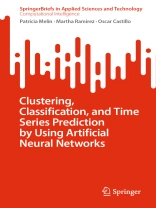This book provides a new model for clustering, classification, and time series prediction by using artificial neural networks to computationally simulate the behavior of the cognitive functions of the brain is presented. This model focuses on the study of intelligent hybrid neural systems and their use in time series analysis and decision support systems. Therefore, through the development of eight case studies, multiple time series related to the following problems are analyzed: traffic accidents, air quality and multiple global indicators (energy consumption, birth rate, mortality rate, population growth, inflation, unemployment, sustainable development, and quality of life). The main contribution consists of a Generalized Type-2 fuzzy integration of multiple indicators (time series) using both supervised and unsupervised neural networks and a set of Type-1, Interval Type-2, and Generalized Type-2 fuzzy systems. The obtained results show the advantages of the proposed model of Generalized Type-2 fuzzy integration of multiple time series attributes. This book is intended to be a reference for scientists and engineers interested in applying type-2 fuzzy logic techniques for solving problems in classification and prediction. We consider that this book can also be used to get novel ideas for new lines of research, or to continue the lines of research proposed by the authors of the book.
Spis treści
1. Introduction to Prediction with Neural Networks.- 2. Literature Review on Prediction with Neural Networks.- 3. Problem Description of Prediction with Neural Networks.- 4. Methodology for Prediction with Neural Networks5.- Results of Prediction with Neural Networks.- 6. Discussion of Prediction Results with Neural Networks.- 7. Conclusions for Prediction with Neural Networks.
O autorze
Patricia Melin holds the Doctor in Science degree (Doctor Habilitatus D.Sc.) in Computer Science from the Polish Academy of Sciences. She is a Professor of Computer Science in the Graduate Division, Tijuana Institute of Technology, Tijuana, Mexico, since 1998. In addition, she is serving as Director of Graduate Studies in Computer Science and head of the research group on Hybrid Neural Intelligent Systems (2000-present). She is past President of NAFIPS (North American Fuzzy Information Processing Society) 2019-2020. Prof. Melin is the founding Chair of the Mexican Chapter of the IEEE Computational Intelligence Society. She is member of the IEEE Neural Network Technical Committee (2007 to present), the IEEE Fuzzy System Technical Committee (2014 to present) and is Chair of the Task Force on Hybrid Intelligent Systems (2007 to present) and she is currently Associate Editor of the Journal of Information Sciences and IEEE Transactions on Fuzzy Systems. She is member of NAFIPS, IFSA, and IEEE. She belongs to the Mexican Research System with level III. Her research interests are in Modular Neural Networks, Type-2 Fuzzy Logic, Pattern Recognition, Fuzzy Control, Neuro-Fuzzy and Genetic-Fuzzy hybrid approaches. She has published over 300 journal papers, 20 authored books, 50 edited books, and more than 300 papers in conference proceedings, for a total of more than 800 publications with h-index of 86 in Google Scholar. She is Editor-in-Chief of the Advances in Fuzzy Systems journal (Wiley). She has served as Guest Editor of several Special Issues in the past, in journals like: Applied Soft Computing, Intelligent Systems, Information Sciences, Non-Linear Studies, JAMRIS, Fuzzy Sets and Systems. She has been recognized as Highly Cited Researcher in 2017 and 2018 by Clarivate Analytics because of having multiple highly cited papers in Web of Science.
Martha Ramırez holds the B.S. in Computer Science, M.S. in Computer Science, and the Ph.D. in Computer Science from Tijuana Institute of Technology. Currently she works at Tecnologico Nacional de Mexico in Mexico City. Her current research interests include hybrid intelligent systems, neural networks and fuzzy systems. She has published more 10 papers in time series prediction, classification and clustering using supervised and unsupervised neural network models, in addition to type-1 and type-2 fuzzy logic for aggregation of responses in ensembles and modular neural networks.
Oscar Castillo holds the Doctor in Science degree (Doctor Habilitatus) in Computer Science from the Polish Academy of Sciences (with the Dissertation “Soft Computing and Fractal Theory for Intelligent and Manufacturing”). He is a Professor of Computer Science in the Graduate Division, Tijuana Institute of Technology, Tijuana, Mexico. In addition, he is serving as Research Director of Computer Science and head of the research group on Hybrid Fuzzy Intelligent Systems. Currently, he is President of HAFSA (Hispanic American Fuzzy Systems Association) and Past President of IFSA (International Fuzzy Systems Association). Prof.
Castillo is also Chair of the Mexican Chapter of the Computational Intelligence Society (IEEE). He is also a member of NAFIPS, IFSA and IEEE. He belongs to the Mexican Research System (SNI Level 3). His research interests are in Type-2 Fuzzy Logic, Fuzzy Control, Neuro-Fuzzy and Genetic-Fuzzy hybrid approaches. He has published over 300 journal papers, 20 authored books, 100 edited books, 300 papers in conference proceedings, and more than 300 chapters in edited books, in total more than 1180 publications (according to Scopus) with h index of 97 and more than 31000 citations according to Google Scholar. He has been Guest Editor of several successful Special Issues in the past, like in the following journals: Applied Soft Computing, Intelligent Systems, Information Sciences, Soft Computing, Non-Linear Studies, Fuzzy Sets and Systems, JAMRIS and Engineering Letters. He is currently Associate Editor of the Information Sciences Journal, Journal of Engineering Applications on Artificial Intelligence, International Journal of Fuzzy Systems, Journal of Complex Intelligent Systems, Granular Computing Journal and Intelligent Systems Journal (Wiley). He was Associate Editor of Journal of Applied Soft Computing and IEEE Transactions on Fuzzy Systems. He has been elected IFSA Fellow in 2015 and MICAI Fellow in 2016. Finally, he recently received the Recognition as Highly Cited Researcher in 2017 and 2018 by Clarivate Analytics and Web of Science.












